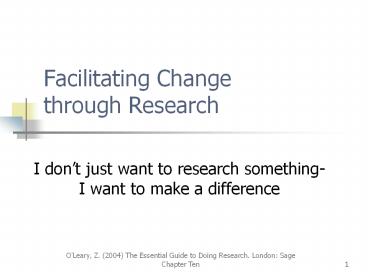Facilitating Change through Research - PowerPoint PPT Presentation
1 / 16
Title:
Facilitating Change through Research
Description:
... Participatory Action Research Critical Ethnography Participatory Action Research Participatory action research attempts to expose dominant and ... – PowerPoint PPT presentation
Number of Views:31
Avg rating:3.0/5.0
Title: Facilitating Change through Research
1
Facilitating Change through Research
- I dont just want to research something- I want
to make a difference
2
Facilitating Change
- Facilitating change through research can involve
- the production of knowledge that may lead to
change - applied research conducted for the express
purpose of enabling effective change - research that attempts to embed action and change
into the actual research process
3
Research generates knowledge in order to
action change within a system
emancipate through action
expose and change the dominate system
pave the way for change
build broader understanding
Basic or pure research
Action research
Critical / radical ethnography
Applied / evaluative research
participatory/ emancipatory
technical/ practical
4
Politics of Change Oriented Research
- Research that facilitates change can be
considered highly political and as such,
credibility will involve careful consideration of
issues of - power
- objectivity
- subjectivity
- and bias
5
Working Towards Credibility
- In addition to both positivist and
post-positivist indicators of credibility, change
oriented research can also look to usefulness
as an indicator of success
6
Applied Research
- Applied research paves the way for change
- It is often linked to policy/programme
development and can include studies that - investigate a problem situation
- assess potential interventions
- or evaluate change initiatives
7
Evaluation Research
- Since change intervention strategies often
require formal review, evaluation research has
become increasingly common - This can involve both
- Formative evaluation - conducted to provide
developmental feedback and - Summative evaluation - conducted to assess
effectiveness.
8
Evaluation Research
- Evaluative research is often conducted in the
form of a case study - In formative studies, methods tend to be eclectic
and diverse and driven by research objectives - Summative designs often involve comparative
analysis of groups and/or time series analysis
9
Issues in Evaluation Research
- Issues in evaluative research include both
- unrealistic client/stakeholder expectations
- and the potential pressure of vested interests
10
Action Research
- Action research covers a broad array of research
strategies that are dedicated to the integrated
production of knowledge and the implementation of
change - Action research
- addresses practical problems
- generates knowledge
- enacts change
- is participatory
- relies on a cyclical self reflective process
11
Cycles of Action Research
12
Issues in Action Research
- While, the participatory and collaborative nature
of action research can be highly rewarding and
productive, it can also result in sticky
management issues including - a lack of control over the projects direction
and pace - the potential for stakeholder conflict
- the sole burden of ethical responsibility
13
Striving for Critical Emancipation
- Striving for critical emancipation relates to
goals that require more than just change within a
system it requires radical change to the
system itself - Two strategies for achieving such goals through
research are - Participatory Action Research
- Critical Ethnography
14
Participatory Action Research
- Participatory action research attempts to expose
dominant and repressive systems, and has an
express goal of emancipation through action - It encourages the oppressed to control their own
knowledge production and emancipatory change
interventions through an action research
process
15
Critical Ethnography
- Critical ethnography also attempts to expose
dominant systems in the interest of the
marginalised - Change comes from the voice offered to the
oppressed, as well as the starting point it
offers for action at individual, legislative, and
policy levels
16
Issues in Emancipatory Research
- A common issue in emancipatory research is the
intertwining of research and political agendas - In addition to managing subjectivities,
researchers need to guard against imposing their
own political agendas on the researched































